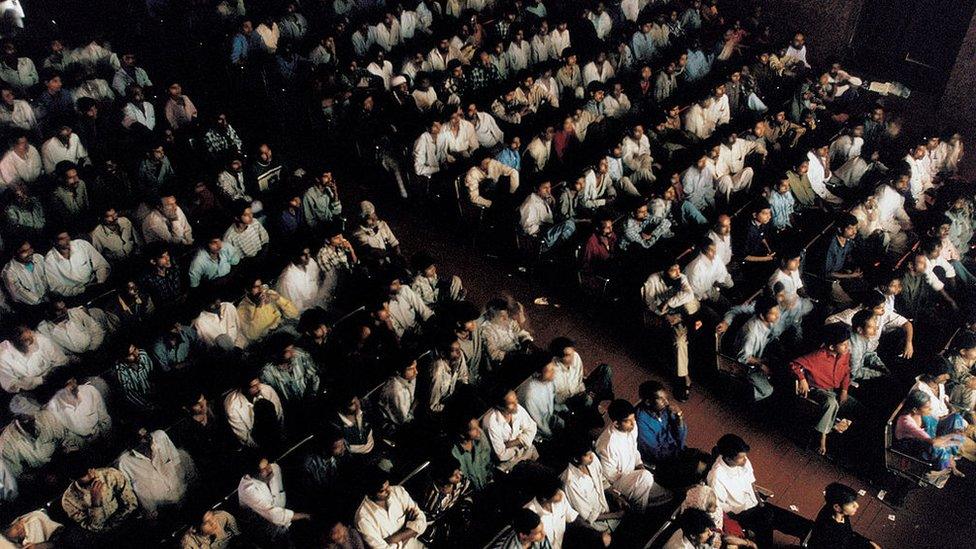Pushpa: Why a song calling out men is under fire for sleaze
- Published

A song that claims to spotlight the male gaze is being called out for doing the opposite
A scantily-clad woman gyrating to a racy song has powered some of India's biggest chartbusters.
So, when a new song from the southern Telugu film industry dropped in December, claiming to subvert the male gaze, it grabbed attention.
It was recorded in five languages - Telugu, Tamil, Kannada, Malayalam and Hindi - and released along with just 19 seconds of footage. The lyrics had the same message across the versions: whether a woman is old or young, tall or short, wearing a sari or a gown, she cannot escape ogling male eyes.
But many women were not impressed. They saw it as a mere gimmick, and a deeply offensive one at that, claiming to break down the very thing it's built upon: the male gaze.
The song's lyrics, in fact, imply women are irresistible sirens, and men are uncontrollable lechers, argue some critics.
And, they say, it has all the elements of what is now a familiar formula: men leering at a woman as she sways, slides and drapes herself over the hero, while a camera constantly cuts to bared bits of her body.
All of this "left little doubt that the video would celebrate all that the words appeared to lament," wrote, external one reviewer.
Sexist but successful
"I examined the different lyrics. There is a line across all the versions which compares women with food," says Sowmya Rajendran, features editor at The News Minute, where she writes about films.
"In Tamil, it's a dessert, in Telugu, grapes, in Malayalam, sugar. Treating women as consumables ends up justifying the ogling and lechery."
Viewers, many of them male, love the song. They have lauded Samantha Ruth Prabhu, the song's protagonist and currently one of the biggest southern female stars, for her performance - since she doesn't appear in the film, Pushpa, beyond the song, they appear elated that a heroine, who has so far been praised for her acting, can also be so titillating.
The full video is yet to drop, even though the movie is out - but the track has now crossed 100 million views on YouTube in Telugu alone. And its title - oo antava - has been trending for days.

India's movie-going audience is still largely male
Unsurprising, given that the so-called "item" song - in Indian male slang, an "item" is a sexy woman - has always been an unabashedly sexist and successful formula.
Most "item" songs treat women like a piece of meat, both visually and in terms of the lyrics, says Ms Rajendran.
She cites one of the worst offenders, the infamous 'Fevicol song, external', featuring Bollywood star Kareena Kapoor Khan, where she mouths lines likening herself to "tandoori chicken that can be washed down with alcohol".
"In many cases, we know nothing about the woman in the song. She has no backstory, she just appears and then disappears from the movie," Ms Rajendran adds.
"Item" songs have long drawn outrage for objectifying women - with tight, revealing clothes, suggestive choreography, raunchy lyrics and voyeuristic camera angles. But they are undeniably popular in a country where the audience is overwhelmingly male.
A popular soundtrack was once essential to a movie's fortunes, drawing people to the cinema and earning huge revenues for music labels. Now, in the age of YouTube and Instagram, songs are even more lucrative.
Decades of objectification
In 1994, journalist Arun Katiyar wrote, external that the success of a scandalous film song the previous year helped create "what the formula-crazed film world calls an 'item'" as people raced to write "obscene lyrics".
The song was choli ke peeche kya hai, which translates to, what's behind your blouse? The innocent answer follows: my heart. But gesturing towards her chest, Madhuri Dixit, a top Bollywood star at the time, indicates there could be a more literal answer.
The risque words and suggestive moves outraged people, including politicians, who argued that it encouraged men to molest women. But the song became a wild hit.

Katrina Kaif (centre) has appeared in many popular item songs
Over time, the clothes got tighter and shorter, and necklines plunged lower - even if the lyrics didn't objectify the woman, the camera did. Soon, "item" songs became glossy spectacles with "special appearances" by top Bollywood stars, from Aishwarya Rai to Katrina Kaif and Deepika Padukone.
"The bigger the heroine in the track, the larger the chances of success of the song since there is no fantasy like watching the ultimate lead actress do a sensuous number," Vinod Bhanushali, then a top executive at India's biggest music label T-Series, told The Indian Express, external in 2010.
And the item song became "cool" - it was blared in nightclubs and inspired legions of wedding dances.
Can an 'item' song empower women?
"Your approach to the issue determines the way you tell your story and position your camera," says Avinash Das, whose 2017 film Anarkali of Aarah is about a singer-dancer in Bihar state.
Anarkali, played by Swara Bhasker, mouths double entendres and dances with abandon, but the film never treats her like an object. The camera avoids close-ups of her body, often focusing on her from a distance to include other performers and the lascivious male gazes around her.

Anarkali of Aarah subverts the idea of an "item" song
In a deeply satisfying subversion of a typical "item" song, Anarkali performs a "revenge" number at the end as she calls out the powerful man who had earlier molested her on stage.
Although it wasn't a commercial success, critics praised the film for putting the woman in control of her sexuality.
Item songs, they argue, do the opposite. "When you see fragmented bits of a woman's body - heaving bosom, swinging navel, shaking hip - you are robbing her of autonomy," actor Shabana Azmi said, external in 2018, adding that most times, the women who appeared in them were "surrendering to the male gaze".
The women would disagree. Malaika Arora has said, external she "never felt objectified" in such songs. Katrina Kaif said she had "enjoyed" doing a 2012 hit after producer-director Karan Johar reiterated, external an earlier apology for including "item" songs in his films.
While "item" songs are sometimes defended for celebrating female sexuality, Ms Rajendran points out that movies that actually do so often land in trouble.
A good way to test these claims, she adds, is to measure the song's effect on viewers.
"Is the song making people uncomfortable by forcing them to confront their biases? Or is it conforming to them?"

You might also be interested in:
Has #MeToo changed Bollywood?
